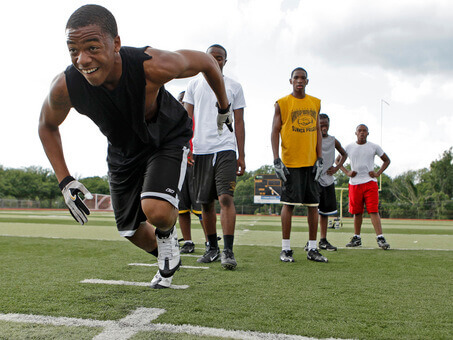Sports Goal-Setting Motivation Achieving Success in Athletics
Explore the significance of sports goal-setting and motivation. Learn how setting goals drives success in athletics.

Sports, in all its various forms, are an integral part of human culture and society. They offer not only entertainment but also numerous physical, mental, and social benefits. Whether you are a professional athlete or a weekend warrior, setting goals and staying motivated are crucial elements in achieving success and personal growth in the world of sports. This article delves into the necessity of goal-setting and motivation in sports, highlighting their significance in enhancing performance, fostering personal development, and promoting a healthy and competitive sporting environment.
The Power of Goal-Setting in Sports
Goal-setting is the process of identifying specific objectives or targets that an individual or a team aims to achieve within a set timeframe. In sports, this practice is not merely a formality but a fundamental aspect of training and competition. Here's why goal-setting is crucial:
Clarity of Purpose: Setting clear and specific goals provides athletes with a sense of direction. It answers the fundamental question, "What do I want to achieve?" Without a clear target, athletes may lack motivation and focus, leading to aimless training and performance.
Motivation: Goals serve as powerful motivators. They create a sense of purpose and drive that pushes athletes to strive for excellence. When athletes know what they are working towards, they are more likely to put in the effort required to reach their goals.
Measurable Progress: Goals provide a means to measure progress. By breaking down long-term objectives into smaller, manageable steps or short-term goals, athletes can track their advancement, which can boost confidence and maintain motivation.
Accountability: Publicly stated goals hold athletes accountable to themselves and their teammates, coaches, and supporters. This sense of responsibility can drive athletes to stay committed to their training regimens.
Adaptability: Goal-setting allows for adaptability. Athletes can adjust their goals as they progress and gain a better understanding of their capabilities and limitations. This flexibility is essential for long-term success.
Competitive Edge: In a competitive sports environment, setting and achieving goals can be the difference between success and failure. Athletes who set and strive for challenging goals are more likely to outperform those who lack such targets.
Resilience: Goals can also help athletes build resilience. Facing setbacks and failures is an inevitable part of sports, and having well-defined goals can help athletes bounce back, learn from their mistakes, and continue to improve.
Enhanced Focus: Goals keep athletes focused on their training and competition. Distractions and complacency are less likely to derail their progress when they have a clear target in mind.
The Role of Motivation in Sports
Motivation is the internal or external drive that compels individuals to take action. In sports, motivation plays a vital role in determining an athlete's commitment, effort, and ultimately, their success. Let's explore the necessity of motivation in sports:
Initiation and Sustenance: Motivation is what gets athletes started on their journey in sports. Whether it's the passion for the game, the desire for success, or the thrill of competition, motivation is the spark that ignites an athlete's involvement. Furthermore, motivation is needed to sustain effort over the long term, especially when faced with challenges and obstacles.
Consistency: Consistency in training and performance is key to improvement in sports. Motivated athletes are more likely to maintain a regular training schedule and put in the necessary work, leading to gradual but sustainable progress.
Effort and Intensity: The level of effort and intensity an athlete puts into their training and competition is directly related to their motivation. Highly motivated athletes tend to push themselves harder, which can lead to improved performance.
Resilience: Motivation helps athletes develop resilience. It gives them the mental strength to persevere through setbacks, injuries, and tough times. Motivated athletes are more likely to bounce back from failures and stay committed to their goals.
Focus and Concentration: Motivated athletes are better able to maintain focus and concentration during training and competition. This heightened mental state can lead to improved decision-making, precision, and execution of skills.
Self-Confidence: Motivation can boost an athlete's self-confidence. Believing in one's abilities is crucial for success in sports, and motivation can provide the necessary self-assurance to take risks and perform at one's best.
Overcoming Fear: In high-pressure situations, fear and anxiety can hinder performance. Motivated athletes are better equipped to manage and overcome these emotions, allowing them to excel under pressure.
Team Cohesion: Motivated athletes contribute positively to team dynamics. Their enthusiasm and dedication can inspire and uplift their teammates, fostering a cohesive and supportive team environment.
Longevity: Athletes who are driven by strong motivation are more likely to have long and successful careers. Their passion for the sport keeps them engaged and willing to invest the time and effort required to excel.
Goal-Setting and Motivation: A Dynamic Duo
While goal-setting and motivation are valuable individually, their true power becomes evident when they work together synergistically:
Goal-Setting Enhances Motivation: Setting challenging yet achievable goals can significantly boost an athlete's motivation. When athletes have a clear target, they are more likely to become intrinsically motivated, driven by their personal desire to achieve their goals.
Motivation Fuels Goal Pursuit: Motivation provides the energy and determination needed to pursue and attain goals. Athletes with high levels of motivation are more likely to stay committed to their goals and push through obstacles.
Feedback Loop: The relationship between goal-setting and motivation forms a positive feedback loop. As athletes make progress toward their goals, their motivation increases, and this heightened motivation, in turn, drives them to work even harder to achieve their objectives.
Adaptability and Flexibility: The combination of goal-setting and motivation allows athletes to adapt and be flexible in their approach. If a goal becomes unattainable or needs adjustment due to unforeseen circumstances, a motivated athlete will be more willing to adapt their goals and continue striving for excellence.
Examples from the World of Sports
Numerous examples from the world of sports illustrate the profound impact of goal-setting and motivation on athletes' performances and careers.
Michael Phelps: The most decorated Olympian of all time, Michael Phelps, attributed much of his success to goal-setting. He set specific and challenging goals for himself, such as winning a certain number of gold medals, and his unwavering motivation drove him to train rigorously and achieve those goals.
Cristiano Ronaldo: Ronaldo is known for his incredible work ethic and motivation. He consistently sets and pursues goals to improve his skills and maintain peak performance. His motivation to be the best player in the world has led to an illustrious career.
Serena Williams: Serena Williams has set numerous records in tennis, thanks to her dedication to setting and achieving goals. She constantly seeks to improve her game and maintain her competitive edge through motivation and goal-setting.
Usain Bolt: The world's fastest man, Usain Bolt, set the goal of becoming a sprinting legend. His motivation to achieve this goal pushed him to break world records and dominate the sport of track and field.
LeBron James: LeBron James, an NBA icon, has consistently set goals to win championships and be a leader on and off the court. His unwavering motivation to be the best player in the league has driven him to success throughout his career.
Promoting Goal-Setting and Motivation in Youth Sports
Goal-setting and motivation are not limited to elite athletes; they are equally important for young athletes participating in youth sports. Here's how coaches and parents can foster these qualities in young athletes:
Set Realistic and Age-Appropriate Goals: Coaches and parents should help young athletes set goals that are challenging but achievable. These goals can include skill development, teamwork, and personal improvement.
Emphasize Intrinsic Motivation: Encourage young athletes to find joy and satisfaction in the process of playing sports rather than solely focusing on winning. Emphasize the importance of personal growth and improvement.
Provide Positive Feedback: Recognize and celebrate the efforts and achievements of young athletes, regardless of the outcome. Positive reinforcement can boost their motivation and self-esteem.
Teach Resilience: Help young athletes understand that setbacks and failures are part of the journey. Teach them to view these experiences as opportunities to learn and grow, rather than as defeats.
Lead by Example: Coaches and parents should model goal-setting and motivation themselves. When young athletes see adults setting and pursuing their own goals, they are more likely to adopt these habits.
Encourage Self-Reflection: Teach young athletes to reflect on their performances and set new goals based on their self-assessment. This promotes self-awareness and a sense of responsibility for their own development.
In the world of sports, goal-setting and motivation are not mere concepts but essential tools for success. Athletes at all levels, from beginners to elite professionals, benefit from the clarity of purpose, drive, and determination that these two factors provide. Goal-setting offers direction and structure, while motivation fuels the relentless pursuit of excellence. When used in harmony, they create a powerful synergy that propels athletes to new heights of achievement. By recognizing the necessity of goal-setting and motivation in sports, athletes can unlock their full potential and enjoy a fulfilling and successful sporting journey. Whether it's breaking world records, winning championships, or simply improving one's personal best, the journey begins with setting clear goals and staying motivated every step of the way.
What's Your Reaction?















